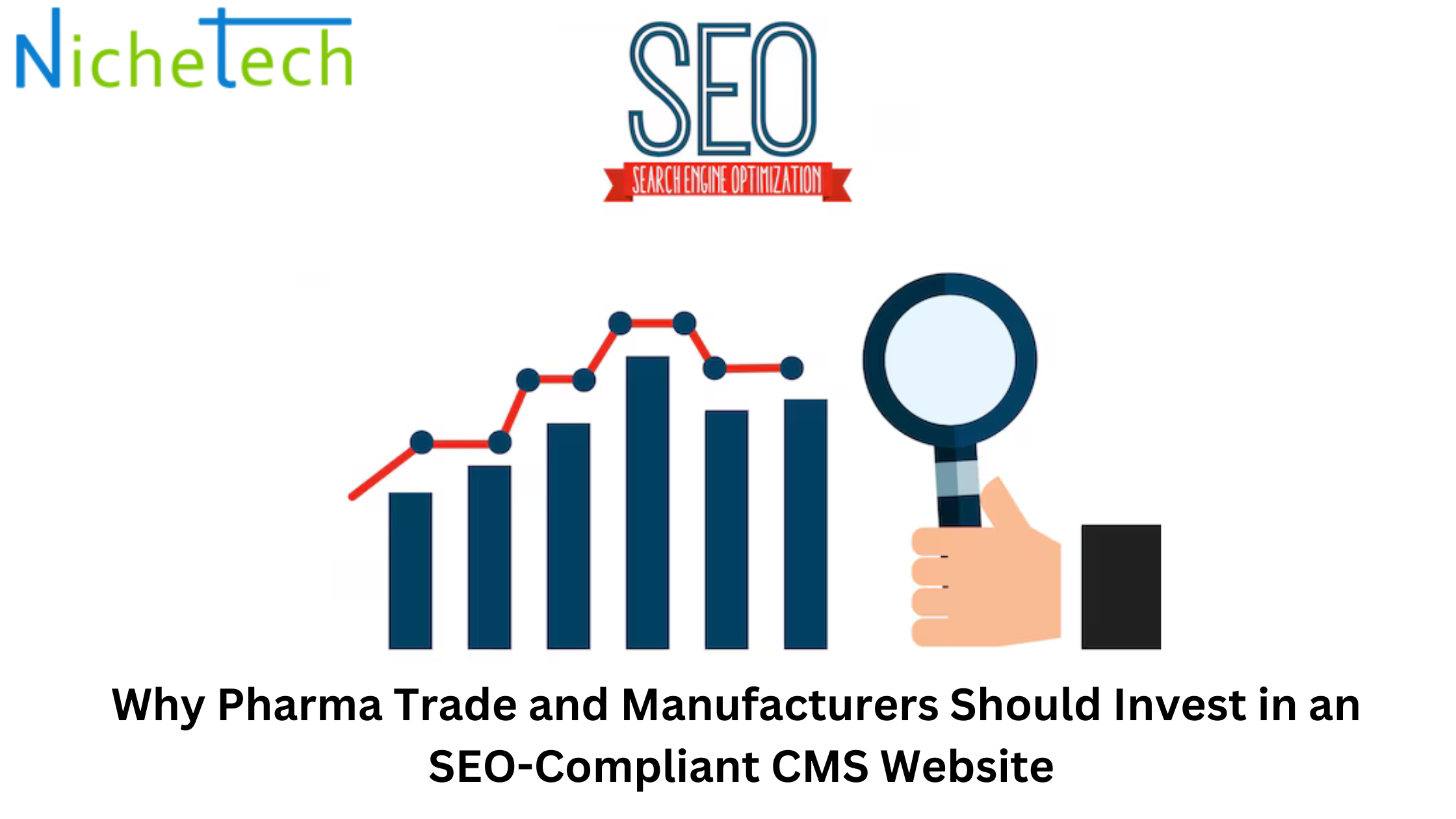In today’s digital landscape, the pharmaceutical industry is rapidly evolving, and businesses in this sector must adapt to remain competitive. Whether you’re a pharma manufacturer, distributor, or wholesaler, having a strong online presence is no longer optional—it’s essential. One of the best ways to establish and enhance that presence is by building an SEO-compliant website powered by a Content Management System (CMS).
This blog will explor why pharma trade and manufacturers should prioritize building an SEO-optimized CMS website and how it can drive business growth, improve brand visibility, and enhance customer engagement.
1. Increased Online Visibility
In a highly regulated and competitive industry like pharma, being discoverable online is crucial for success. Most customers whether they are healthcare providers, pharmacists, or distributors start their research online, using search engines like Google to find pharmaceutical products, suppliers, and services.
How SEO Improves Visibility:
Search Engine Optimization (SEO) ensures that your website ranks higher in search engine results pages (SERPs) when potential customers search for relevant keywords (e.g., drug names, medical supplies, wholesale distributors).
An SEO-compliant CMS allows you to optimize your website’s structure, content, meta tags, images, and URLs for search engines, making it easier for users to find your site.
SEO helps you target both local and global audiences, especially if you’re serving different regions or markets.
Without SEO, your website is unlikely to appear in the top results, making it nearly invisible to prospective clients or partners searching for pharmaceutical solutions.
2. Build Trust and Credibility in a Regulated Industry
The pharmaceutical industry is built on trust, compliance, and regulations. Customers, healthcare professionals, and business partners expect companies in the pharma space to be transparent, reliable, and compliant with industry standards. An SEO-optimized CMS website helps build this credibility in several ways:
Why It Matters:
User-Friendly Experience: A well-structured, SEO-compliant website makes it easy for users to navigate, access information, and find the products or services they need. This enhances your business’s professionalism and trustworthiness.
Accurate and Relevant Content: An SEO strategy ensures that the content on your website is relevant to what your customers are searching for. By providing accurate product information, certifications, and regulatory approvals, you can position your company as a trusted leader in the industry.
Secure Website (SSL): SEO best practices also include ensuring that your website is secure (using HTTPS/SSL). This is especially important for pharma companies, as customers may share sensitive data or make transactions online.
By adhering to SEO best practices, your website not only gains better search rankings but also establishes trust and credibility with customers and industry stakeholders.
3. Better User Experience for Healthcare Professionals
An SEO-compliant CMS website doesn’t just cater to search engines it also prioritizes the user experience (UX). Many of your website visitors are likely to be healthcare professionals or procurement managers who are looking for precise and technical information.
How SEO Enhances User Experience:
Mobile Responsiveness: A CMS with built-in SEO tools ensures that your website is optimized for mobile devices, allowing users to access your site on smartphones or tablets seamlessly.
Faster Loading Times: Search engines, like Google, prioritize websites with faster load times. An SEO-compliant website ensures that your pages load quickly, which is crucial for keeping visitors engaged and reducing bounce rates.
Logical Site Structure: SEO optimization improves the site’s navigation by creating a logical structure with clear categories, product descriptions, and internal links. This helps users quickly find the products or services they are searching for.
A positive user experience keeps visitors on your site longer, improves engagement rates, and increases the chances of conversion—whether that’s filling out a contact form, requesting a quote, or completing a purchase.
4. Competitive Advantage in a Niche Market
The pharmaceutical trade and manufacturing industry is vast, but also highly niche. Targeting the right audience is essential for generating leads, closing deals, and scaling your business. SEO compliance gives your website an edge over competitors who are not investing in digital strategies.
Why SEO Provides a Competitive Edge:
Targeted Keywords: SEO allows you to target specific, high-converting keywords related to your products (e.g., “pharma manufacturing services” or “bulk pharmaceutical ingredients”), helping you reach an audience that is actively searching for these terms.
Competitor Analysis: An effective SEO strategy involves researching competitor keywords and content strategies. This ensures that you stay ahead of the competition by ranking for industry-specific search terms.
Local SEO: For companies looking to serve specific regions or territories, local SEO can enhance visibility to nearby clients or partners who may be searching for local pharmaceutical suppliers or manufacturers.
By leveraging SEO, your business can improve its search rankings, drive more traffic, and outperform competitors who rely solely on offline or traditional marketing channels.
5. Compliance with Pharma-Specific Regulations
Pharmaceutical companies must adhere to strict regulations and guidelines, including how they market their products and provide information online. An SEO-compliant CMS website can ensure that your content and website structure align with regulatory standards while improving your search engine visibility.
Regulatory Considerations:
Accurate Information: SEO encourages you to create accurate, informative, and compliant content that satisfies both search engines and regulatory bodies, such as the FDA or EMA.
Structured Data and Schema Markup: A CMS optimized for SEO can support schema markup, which helps search engines understand the content on your site better. This is particularly useful for pharmaceutical companies that need to display product information, ingredients, and dosages in a structured format.
Secure Transactions and Data Privacy: Compliance with data protection regulations like GDPR or HIPAA can be integrated into your SEO strategy. A secure, well-optimized site assures customers and partners that their data is protected.
Having a website that is not only SEO-optimized but also compliant with pharmaceutical regulations protects your business from legal issues while driving traffic.
6. Content Marketing and Lead Generation
An SEO-compliant CMS makes it easy to create and update content, which is crucial for any successful content marketing strategy. Pharmaceutical companies can leverage content marketing to educate their audience, promote new products, and establish themselves as thought leaders in the industry.
Benefits of Content Marketing with SEO:
Educational Resources: Create blog posts, white papers, case studies, and research articles that answer common questions, highlight your expertise, and improve search rankings.
Lead Generation: An SEO-optimized site makes it easier to generate leads by providing gated content (e.g., downloadable reports or exclusive webinars) that users can access by filling out forms.
Product Listings and Catalogs: SEO ensures that each product listing on your site is optimized with relevant keywords and descriptions, driving organic traffic to your product pages and converting visitors into leads.
This combination of SEO and content marketing can significantly improve your lead generation efforts while nurturing potential clients or partners through the buying process.
7. Cost-Effective Marketing Strategy
Pharmaceutical companies often rely on traditional marketing methods, such as trade shows, print media, and B2B networking. While these methods can still be effective, they are costly and provide limited reach compared to a robust digital marketing strategy centered on SEO.
Why SEO is Cost-Effective:
Long-Term Investment: Unlike paid advertising (which stops working the moment you stop spending), SEO offers long-lasting results. Once your website ranks well for important keywords, you can continue to attract organic traffic without ongoing costs.
Reduced Advertising Spend: By ranking organically for important search terms, you can reduce your reliance on paid search or expensive ad campaigns.
Global Reach at a Lower Cost: SEO allows you to reach potential customers and partners around the world, enabling pharmaceutical companies to expand into new markets without a massive budget.
A well-executed SEO strategy is one of the most cost-effective ways for pharma companies to promote their products, drive traffic, and capture leads over the long term.
For pharma trade and manufacturers, having an SEO-compliant CMS website is no longer just a marketing option—it’s a necessity. It boosts online visibility, builds trust and credibility, enhances user experience, and gives your business a competitive edge. In a highly regulated and competitive industry, an optimized CMS ensures that your website is not only compliant with industry standards but also capable of reaching a global audience.
By investing in an SEO-driven approach, pharmaceutical companies can effectively position themselves for long-term growth, drive more traffic, and generate high-quality leads, all while ensuring their online presence aligns with regulatory requirements.
Direct-to-consumer (D2C) businesses are revolutionizing how products are sold, bypassing traditional retailers to connect directly with customers. But for a D2C company, choosing the right e-commerce platform is crucial. Shopify stands out as the best option for D2C brands, and here’s why.
1. Built for Scalability
D2C businesses often aim to grow rapidly, and Shopify is designed to scale with you. Whether you’re just starting with a few products or managing a vast inventory with thousands of SKUs, Shopify offers seamless upgrades and tools to accommodate your growth. With features like unlimited products and bandwidth, you never have to worry about outgrowing the platform.
2. User-Friendly Interface
Shopify’s intuitive interface ensures that even those without technical expertise can build and manage an online store. With drag-and-drop functionality, customizable templates, and pre-built themes, creating a professional-looking store is effortless. This allows D2C entrepreneurs to focus more on their business strategy and less on technical challenges.
3. Streamlined Payment and Checkout
Shopify supports over 100 payment gateways, including its own Shopify Payments, which simplifies the checkout process for customers. A seamless checkout experience reduces cart abandonment rates, an essential factor for D2C brands that rely heavily on converting traffic into sales.
4. Exceptional Mobile Optimization
With a significant portion of e-commerce transactions happening on mobile devices, having a mobile-optimized store is non-negotiable. Shopify ensures that your store looks and performs excellently on all devices, enhancing the customer experience and boosting sales.
5. Marketing and SEO Features
Shopify comes equipped with built-in marketing tools that are a boon for D2C brands. From email marketing integration to customizable meta tags and URL structures, Shopify makes it easy to optimize your store for search engines. Plus, its seamless integration with Google, Facebook, and Instagram helps you manage campaigns directly from your dashboard, driving more traffic to your store.
6. Customization and App Ecosystem
Shopify’s app store is a goldmine for D2C businesses. Whether you need apps for email marketing, inventory management, customer support, or upselling, Shopify developers ecosystem has you covered. It also supports custom coding, giving you complete control over your store’s design and functionality.
7. Reliable Hosting and Security
D2C brands can’t afford downtime or security breaches. Shopify offers reliable hosting with 99.99% uptime and Level 1 PCI DSS compliance, ensuring that your customer data is safe and your store remains operational 24/7.
8. Analytics and Insights
Understanding customer behavior and sales trends is vital for a D2C brand. Shopify provides detailed analytics and reporting tools, helping you track sales, monitor inventory, and make data-driven decisions to grow your business.
9. Omnichannel Selling Made Easy
Shopify enables D2C brands to sell across multiple channels, including social media platforms, Amazon, and brick-and-mortar stores, all managed from a single dashboard. This omnichannel approach helps you reach customers wherever they are, ensuring a seamless shopping experience.
10. Cost-Effective for Startups
For D2C startups, budget is often a concern. Shopify’s tiered pricing plans cater to businesses of all sizes, making it accessible whether you’re starting small or expanding rapidly. Its transparent pricing and lack of hidden fees mean you can plan your expenses confidently.
Context
For a D2C company, success hinges on delivering a superior customer experience and efficiently managing your operations. Shopify provides the tools, scalability, and flexibility that D2C brands need to thrive in a competitive market. Whether you’re a budding entrepreneur or an established business, Shopify is your partner for growth.
If you’re ready to elevate your D2C business, Shopify is the perfect platform to bring your vision to life. Start your journey today!







